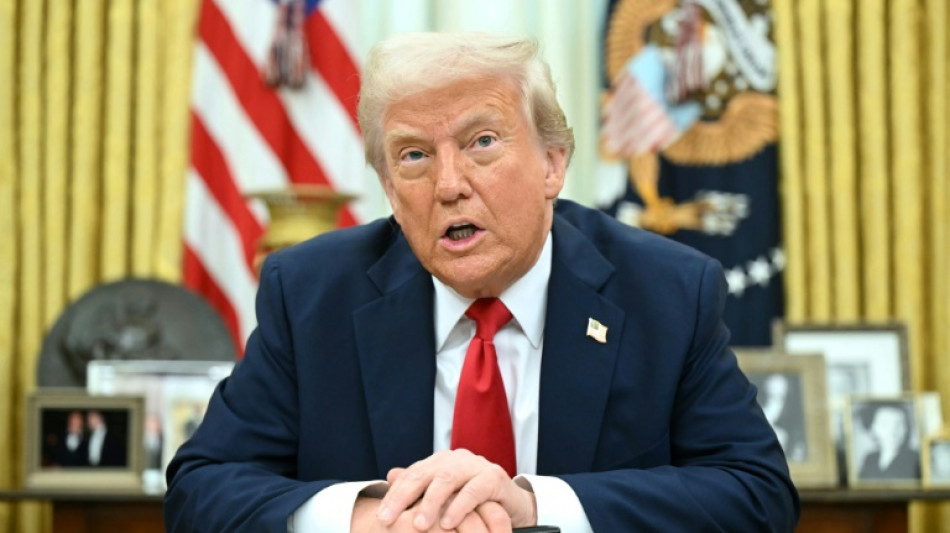
Trump 'perfecting' new tariffs as nervous world braces

US President Donald Trump kept the world's leading economies on edge Tuesday as he made final preparations for a "Liberation Day" announcement of sweeping new tariffs that could trigger a global trade war.
Trump has promised to be "very kind" when he unveils the so-called reciprocal tariffs on Wednesday, but uncertainty reigned over which countries would be targeted and by how much.
His plan has prompted vows of retaliation from major economies including the European Union on Canada and fears that it could unleash a recession at home and abroad.
The White House said Trump, who will announce the tariffs in the Rose Garden at 2000 GMT on Wednesday, had "made a decision" but was still putting the finishing touches on the measures.
"He is with his trade and tariff team right now, perfecting it to make sure this is a perfect deal for the American people and the American worker," Press Secretary Karoline Leavitt told a briefing.
The White House would not confirm reports in US media that Trump was considering across-the-board tariffs of around 20 percent, rather than different amounts for different countries.
But Leavitt said the tariffs would take effect "immediately" after the announcement, meaning there would be no time for foreign leaders to negotiate carve-outs before they start.
- 'Very nice' -
The Republican billionaire, a fan of tariffs for decades, indicated on Monday night that the tariffs would be lower than what other countries would be charging the United States.
"We're going to be very nice, relatively speaking, we're going to be very kind," he said in the Oval Office.
Critics warn that the strategy risks a global trade war, provoking a chain reaction of retaliation.
America's trading partners have been preparing to respond, even as they continue efforts to make last-minute negotiations with Trump.
"We are going to be very deliberate in terms of the measures we take, to fight for Canada," Canadian Prime Minister Mark Carney, who spoke to Trump last week, said on Tuesday.
The European Union, which Trump has accused of trying to "screw" the United States, said Tuesday it still hoped to negotiate a solution -- but that "all instruments are on the table" to retaliate if necessary.
British Prime Minister Keir Starmer spoke with Trump on "productive negotiations" towards a UK-US trade deal. Vietnam said on Tuesday it would slash duties on a range of goods to appease Trump.
"The president is always up to take a phone call, always up for a good negotiation," Leavitt said.
- Volatile stocks -
Trump, who returned to power in January, is promising even bigger tariffs than the ones he unleashed in his chaotic first term.
He claims they will drive the "rebirth" of America as a manufacturing giant and stop it being "ripped off" by other countries.
But his plans have caused huge uncertainty, jolting markets around the world for days.
Stocks rose on Tuesday after days of volatility, as investors hoped that Trump's latest tariffs could be his last.
Fears of a recession are also mounting, with experts predicting US consumers will bear the brunt of tariffs in an economy already unnerved by huge US government cuts led by billionaire advisor Elon Musk.
Trump has already imposed a range of tariffs on key economic rivals since taking office for a second time.
Last week he announced a 25 percent tariff on all auto imports, while a 25 percent tariff on steel and aluminum from around the world came into effect in mid-March.
China was hit in March by additional 20 percent tariffs on all goods, triggering retaliatory duties from Beijing. The EU has unveiled its own measures to start mid-April.
Trump has however delayed tariffs on goods from Canada and Mexico.
But the threat of a trade war has caused increasing political ructions, with Canada's looming general election on April 28 set to be dominated by how to deal with Trump, who has also called for the United States to annex Canada.
F.Lang--BlnAP

 London
London

 Manchester
Manchester
 Glasgow
Glasgow
 Dublin
Dublin
 Belfast
Belfast
 Washington
Washington
 Denver
Denver
 Atlanta
Atlanta
 Dallas
Dallas
 Houston Texas
Houston Texas
 New Orleans
New Orleans
 El Paso
El Paso
 Phoenix
Phoenix
 Los Angeles
Los Angeles



